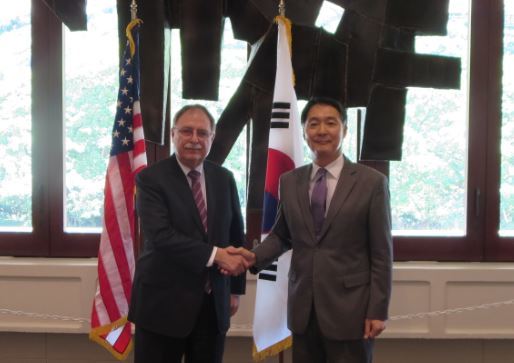 |
|
Ministry of Foreign Affairs defense cost sharing negotiation representative Jang Won-sam shakes hands with his State Department counterpart Timothy Betts during senior-level meetings on the SMA to discuss a cost sharing agreement for the THAAD missile defense system in Honolulu on Mar. 7. (provided by Foreign Ministry)
|
Foreign Ministry expects tough negotiations with the US over cost sharing for the missile defense system
As predicted, the US Donald Trump administration appears to have demanded that South Korea pay operational costs for the THAAD system deployed by US Forces Korea during the first meeting on the tenth Special Measures Agreement (SMA) on the two sides’ sharing of defense costs. The US administration’s position was confirmed in the two sides’ first “reconnoitering engagement” in Honolulu last week. In a Mar. 12 meeting with reporters, a South Korean Ministry of Foreign Affairs senior official acquainted with the defense cost negotiation system declined to give a direct answer when asked if there had been discussions on the THAAD costs, but did not deny the discussions had taken place. “I’ll leave that for you all to determine,” the official said. “We have said that the focus is on the SMA and on the long-term conditions for stationing USFK, and I have nothing more to say beyond that,” the official added. The official also faced repeated questions about whether Seoul did not plan to comply with US demands during the talks for it to pay for the THAAD system’s operation. “That is correct,” the official replied, adding that they had “stated our position clearly [before].” In a Feb. 2017 press interview, Trump said he had “informed South Korea it would be appropriate if they pay [the THAAD costs],”stressing that it was a “billion dollar system.” Predictions that the US would hand over a “bill” for THAAD now appear to be coming true in the defense cost sharing negotiations. In their initial encounter, the two sides reportedly revealed differences while stating their basic positions on the amount, validity period, and institutional improvements. A senior official from the South Korean Ministry of Foreign Affairs stressed that it was an “exploratory, basic exchange of opinions,” but added, “I can say that these will be tough negotiations.” South Korea and the US held their first senior-level meeting toward the signing of a cost sharing agreement for THAAD in Honolulu on Mar. 7–9. The senior representatives there were Ministry of Foreign Affairs defense cost sharing negotiation representative Jang Won-sam from the South Korean side and his State Department counterpart Timothy Betts. The delegations held five rounds of discussions over the three-day period. A Ministry of Foreign Affairs official said the two sides agreed there on the “need to steer these discussions in the direction of a stronger allied defense posture and contributing to the development of the South Korea-US alliance.” “The South Korean and US sides agreed to take the South Korean budget formation schedule into account in the discussions and hold the next discussions in South Korea during April,” the official added. The defense cost share refers to the amount paid by South Korea toward USFK stationing costs. The share is used to pay personnel costs for South Korean workers with USFK, construction efforts within US bases, and logistical support. South Korea’s share last year was around 950.7 billion won (US$893.7 million); the tenth round of negotiations that began last week concern the amount to be paid as of 2019. By Kim Ji-eun, staff reporter Please direct questions or comments to [english@hani.co.kr]






